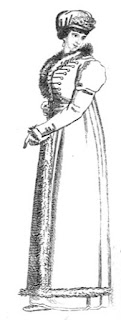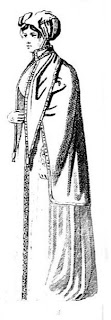My series of fashion blogs continues with a look at the walking dress.
La Belle Assemblée presents us with a picture of what the ton might have worn for those all-important promenades, where the object was to be seen wearing the latest mode of coat or walking dress. This post looks at the pre-Regency period using plates from
La Belle Assemblée from 1806, 1807 and 1810.
Spring 1806
 |
Cloth great coat in the Hussar style
from La Belle Assemblée (Feb 1806) |
|
In March 1806, those aspiring to the heights of fashion might have been seen wearing a Hussar-style coat, a Bedford pelisse or a York mantle, whilst the black velvet pelisse was very popular. It seems likely, however, that no aspirant to fashion would have worn such a pelisse again after the following blighting comment appeared in the February issue of
La Belle Assemblée:
“The most prevalent pelisses are made of black velvet, with a flounce of deep rich black lace; this last walking dress is worn by all kinds of fashionables, which renders it common, and is abandoned by those who pretend to real taste and novelty.”
 |
Bedford pelisse and hat
from La Belle Assemblée (Feb 1806) |
Bedford pelisse and hat, colour,
La Bou de Paris, trimmed with fir to match.
 |
York mantle and hat
from La Belle Assemblée (Feb 1806) |
York mantle and hat, seal-skin or Gregorian cloth, edging orange and scarlet, India-pattern. Walking dress, cambric muslin, with work.
Spring 1807
 |
Polish walking dress
from La Belle Assemblée (Feb 1807) |
"A Polish Robe of purple velvet, flowing open in front, rounded gradually from the bottom towards the lapels, which are continued across the shoulder, and finished in regular points on the back. A chemisette of the same, with high full collar; the whole trimmed entirely round with the red fox, mole, leopard spot or grey squirrel. A rich cord and tassel fastened in the centre of the back, which occasionally confines the robe. The back and skirt cut in one; and the sleeve neatly to fit the arm. Polish cap of the same material, trimmed round the edge, and across the crown, with correspondent skin; a cord and tassels suspended in irregular lengths from the right side of the crown. York tan gloves; and primrose or purple shoes.”
Spring 1810
 |
Hyde-Park walking dress
from La Belle Assemblée (Feb 1810) |
“A pelisse of black Merino cloth or velvet, buttoned from the throat to the feet, made to fit tight to the shape with a band and crape, ornamented with a double row of gold braiding, or an oriental embossed silk trimming, worn over a chemisette of French lawn. A Spanish hat and flat drooping ostrich feather tipped with orange. Half boots of black or orange coloured Morocco, Angola muff lined with yellow; the hair lightly curled on the left side with a thick braid crossing the face. Earrings of gold, or amber. Gloves of York tan.”
Sources used include:
Bell, John,
La Belle Assemblée, various (1806-1810)






Thanks for the information.
ReplyDeleteI've always wondered just how closely the middle class might have tried to follow the changing fashions. Any idea?
ReplyDeleteI imagine that the emerging middle class tried to emulate the upper class. The middle class would presumably be those that had made their money in trade and many used it to buy estates and move up the social ranking, and so I am sure that they would have generally followed the fashion where they could.
DeleteWas the coat worn over only a chemise or did they wear a "walking" dress under? Perfect outfit for walking in Vauxhall!
ReplyDeleteThe pelisse was worn over a day dress - this is included in the description of the 1823 walking dress described on my blog of post-Regency outdoor fashions: http://www.regencyhistory.net/2012/04/post-regency-spring-fashion-walking.html
Delete